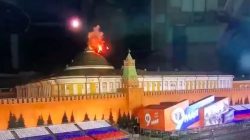
It is not difficult to see who prepared the speech of President Dokka Umarov; they exactly copied down the Kremlin’s strategic program with a difference—they used an Islamic terminology.
“O mighty king,
The sovereign Shah Ismail!
We haven’t known the enemy yet,
Teach us to discern him.
We are handling the sword the wrong way,
And it then slashes us.”
Poet Mamed Araz
The announcement of Ichkerian claims that the North Caucasian emirate or caliphate should be established brings immediately it to mind that this keeps being repeated by our enemies as well: Putin, Patrushev and the almost entire Russian administration, let alone different types of puppets. How can we possibly explain that the two sides, both at war, share very common interests?
We will tell the truth in the specific language that it uses, leaving aside sentiments, in order both to demonstrate the seriousness of the question at hand and to do away with any kinds of accusations against us. It was on September 6 of
In this respect, it was proposed that President Dokka Umarov should get a signed message from the entire group of conference members. Some of the participants expressed partial approval for the correctness of taking a step of this kind, though they thought it would not be timely to do so. After all, it was only at the level of intention that the idea of taking such a step came about. And then the thing that supporters of independence for the Chechen Republic of Ichkeria feared would happen did actually happen.
All through the past eight years of the second phase of war in Chechnya, we have had to hear a lie from the Kremlin that Russia was fighting both Islamic fundamentalism and international terrorism in their attempts to establish a system of emirate government in North Caucasus in general, in an area extending from the Caspian Sea to the Black Sea in particular. The West was dubious in its acceptance of such deceitful propaganda from the Kremlin. And now we see with our own eyes that the lie has become the reality.
The Chechens have already known over the past ten years about the Kremlin project of emirate. Movladi Udugov, who is head of the aforementioned organization, and who was fired from his position as the Foreign Minister of the Chechen Republic of Ichkeria in 1997, read himself the secret FSB document, titled “A SPECIAL OPERATION TO WIPE OUT SEPARATIST CENTERS OFF NORTH CAUCASUS.”
In fact, this document represents a collection of long-term goals on the part of Russia to achieve; besides, it emerges as a program that was orchestrated under the leadership of Russian President Vladimir Putin to launch a new ‘crusade’ against not only Chechnya but also against all Caucasian Muslims. The news media of Ichkeria quoted and analysed this document over and over again, but the focus was only placed both on the tactics of Russia and the part of it that had already been put into practice. The current topic of discussion is the strategies. What is there in this special document about the Russian strategies for North Caucasus? Here is a summary of them:
“The geopolitical processes that cover a large section of the world demonstrate obviously the line between the two civilizations—Christianity and Islam. The Caucasus is located somewhere in the foreground, and it has been a scene for many important political as well as military fighting in the 21st century. The objective reality is forcing the Catholic-Protestant world to cooperate with Russia against the threat of Islam that has actively emerged in different parts of the world.
Our problem is with Chechnya. We need to make a problem of it for our potential alliances, as well. Our task is to show and explain in words that Chechnya wants to have an independent state of its own in a way that prompts caution on our part against the likelihood of it forming soon an Islamic version of terrorism. It is also clear that a successful emergence of a state of this kind will cause trouble to the West in its efforts to strengthen its own policies here in Trans-Caucasus and Central Asia, areas where the circulation of the dollar currency is at its peak. And it is well known that the money will not go to unstable areas. Therefore, we have the right to expect our western alliances to understand and support the motive behind our actions both to keep the situation in Chechnya stable and to manage the course of events in North Caucasus.”
It is not difficult to tell who exactly set up his speech for President Dokka Umarov. They exactly copied down the strategic program of the Kremlin with a difference—it was set up in an Islamic terminology.
Make your own decision: Dokka Umarov said in his interview with the Radio Svoboda in clear words that the two civilizations are against each other, and that the mujahideens of North Caucasus emirate have the United States, Britain and Israel as their enemies—that is, the entire Catholic-Christian world, just as it had been mentioned in the special FSB document.
Now that the threat of Islamic version of terrorism has become clear, the Catholic-Christian world is only responsible to react likewise. While we were saying previously that the silence on the part of West meant that it just overlooked the severe criminality of Russia; the same West has now gained total freedom to support implicitly the Kremlin in its policies of crushing the Islamic version of terrorism in southern Russia—or more precisely the Chechens.
The Kremlin had one other thing as well, about which analyzers had broad discussions and some Chechen politicians only murmured against. The following announcement came from Putin in March of 2003: “The formal status of Chechnya is not any more of paramount importance to us. The important thing is that Russia should be able to maintain its presence as an eternal threat against Chechnya.” This aphorism came from Putin not only as a surprise to the West, but also an announcement to the Russian people of his plans to act likewise, so that their discontent with the war in Chechnya would disappear. This was actually a well-calculated step towards guaranteed triumph on the part of Putin in the next presidential elections.
And now something else has happened after an interval of four years: Russia faces a real threat from the region of Chechnya, as Dokka Umarov said.
There is another reason why the Kremlin-oriented goals should definitely be achieved: the 2014 Sochi Olympic Games. However, as the special document says, the money will hardly go to places with low-level stability. What actually was meant by this condition is that the entire North Caucasus, extending from the Caspian Sea to the Black Sea, will have to have total stability, peace and freedom from disturbance before the Olympic games begin. The Kremlin—or more precisely Putin, will not ever hesitate to spend lots of money for this to happen. If a goal is impossible to achieve by means of military, then it has to be achieved by means of money; if money does not work, then more money will have to be spent. Unfortunately, the Kremlin has so much money and Putin is spending it as if it were his own money.
And now the next side… Each war ends in peace. The conditions for peace get signed off under the supervision of observers when they are tabled for discussion. The recent statements from Dokka Umarov seems to be intended to annihilate any types of legal grounds for future negotiations between Russia and Chechnya. International observers cannot attend conjectural negotiations, because the North Caucasus emirate declared its war against all world communities. The upshot of all this will be a disaster…
It would perhaps be needless to say at this point that the Chechens who expect to take a refugee status abroad would face a lot of trouble. I certainly believe that no Chechen would run away to what gets called Muslim countries or even to alliances that were announced by the emirates while they established the North Caucasus emirate. This is so only because such alliances neither exist nor will they exist in the near future.
Moving ahead with the subject of Chechen refugees, I need to say that the statement about efforts to establish an emirate in Chechnya will at any rate provide the ground for the European bureaucrats of migration service to prevent the Chechens from taking refuge in European countries. It then becomes automatically clear how much energy and force it will take the Chechens to get themselves permission from any European countries.
It is said that hope dies last… The Chechens are hoping that President Dokka Umarov will continue to regard himself as a powerful and heroic statesman with a firm decision to get rid of those who damage his image, and he will not ‘officially’ announce his decision to establish the emirate, because it otherwise will cost both Chechens and Chechen mujahideens a lot. This should at least be done on behalf of those 250,000 people who were either killed or tortured—among whom were members of their own families, their own relatives, their own friends in the army, and the deceased administrators who asked before they died their future generations to fight for the independence of Ichkeria, a place inextricably bound to North Caucasus, the homeland of the whole of humanity. ÖZ/FT
This is an article that veteran Chechen journalist Mayirbek Taramov wrote for Agency
Mayirbek Taramov








